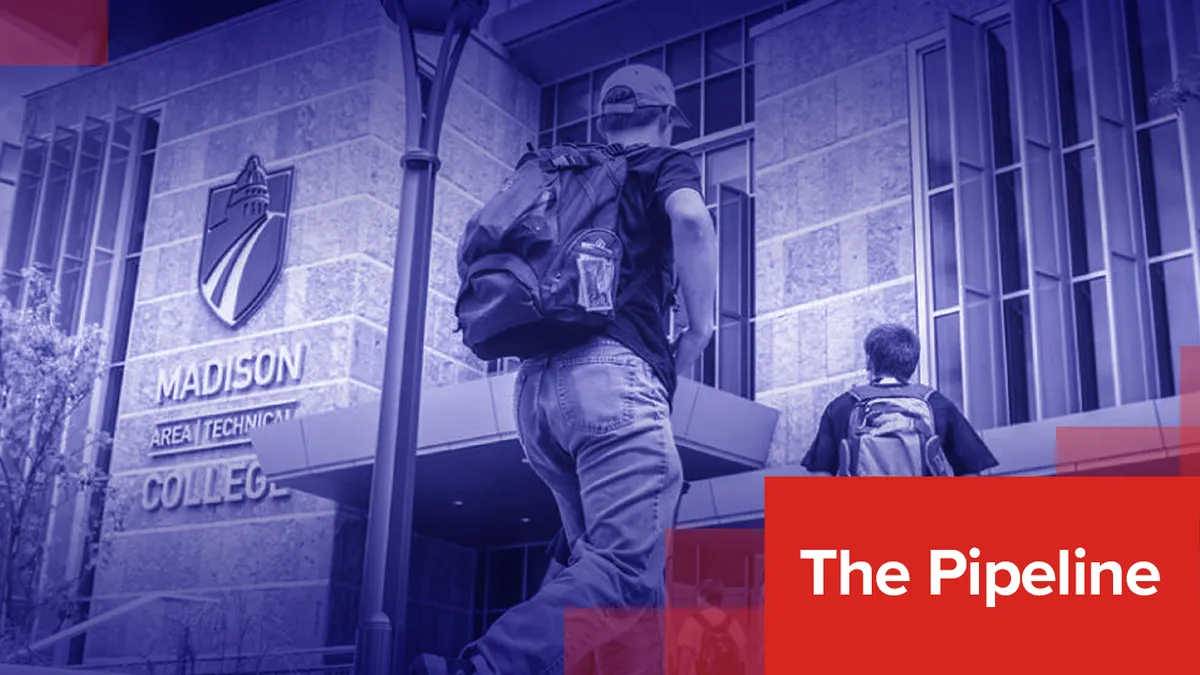Editor's note: It's harder than ever for colleges to fill their incoming classes, but some schools are meeting that challenge with creativity. In this monthly column, called The Pipeline, we'll spotlight innovative tactics colleges are using to cut through the noise and reach prospective students throughout the recruitment and enrollment process.
Madison Area Technical College has a proposition for students unsure whether to enroll: attend classes for a week and, if they're not a fit, drop them at no cost to you.
The free trial is one of several ways community colleges are reducing financial risk for students to get them in the door during a turbulent time. The stakes are high. Overall enrollment at public two-year schools fell 10% last fall, while the number of first-time students was down 21%.
The shift online hasn't necessarily helped. While virtual classes let colleges continue their programming during the pandemic, some students have said the experience fell short of expectations or that they struggled to learn online. Access to technology and the internet has also been a barrier. And safety protocols limited the hands-on training schools could offer.
With its College Try offer, Madison College, which is located in Wisconsin's capital city, also wants to help students figure out if online learning works for them. New students and those enrolled prior to fall 2020 but not since then qualify. Current students aren't eligible because most had a chance to experience online classes, said Kristin Uttech, the college's chief marketing officer.
National research offers some insight into how the pandemic is affecting students. Wanting to see how that applied to their campus, Madison officials asked current and prospective students of all ages about their views on coming to college right now and taking classes online, and what kind of messaging would resonate with them.
That's where officials heard "loud and clear" that some people had bad experiences in previous online classes or that they struggle to learn online, Uttech said. The college is underway with similar research on adult students who are returning to college, and so far it is finding that group more open to online classes for the flexibility they offer. Their challenge, though, is balancing competing demands from home and work, especially the childcare responsibilities that fell on many parents this year.
Other supports available through Madison help to round out the free trial offer. Students can rent textbooks, laptops and Wi-Fi hotspots, and they can access tech support through the college. The institution also offers training for instructors to help them teach online, and it connects students with coaches to guide them through remote learning.
This isn't a course audit, Uttech cautioned. Students must apply to the college and follow the typical enrollment process. "We want you to make a commitment because we're making a commitment," she said. Typically, Madison students would pay at least 20% of the tuition for a course they drop on or after the first day of class.
This kind of offer can be a great opportunity to get students in the door, said Hana Lahr, a senior research associate and program lead at the Community College Research Center. But if colleges want students to stay past the free trial period, she added, it's important to help them see the connections between their courses and goals.
Talking to students about their objectives and interests, as well as their financial and time constraints, is key, especially in a pandemic, Lahr said. And getting them into courses early on that have some connection to their field of study is also important, she added.
Only a handful of students to drop classes so far cited the College Try program, Uttech said. The college tracks this information through follow-up withdrawal surveys. Still, Madison extended the offer from the spring into the summer and fall terms. Around 40% of classes will be offered at least partly in person this fall, with the rest as a mix of online synchronous and asynchronous instruction.
The program offers students peace of mind, Uttech said. "Like, hey, we're gonna help you, and if you really feel like, 'Oh, this isn't gonna work,' you can get out and we're not going to give you any financial penalty."













